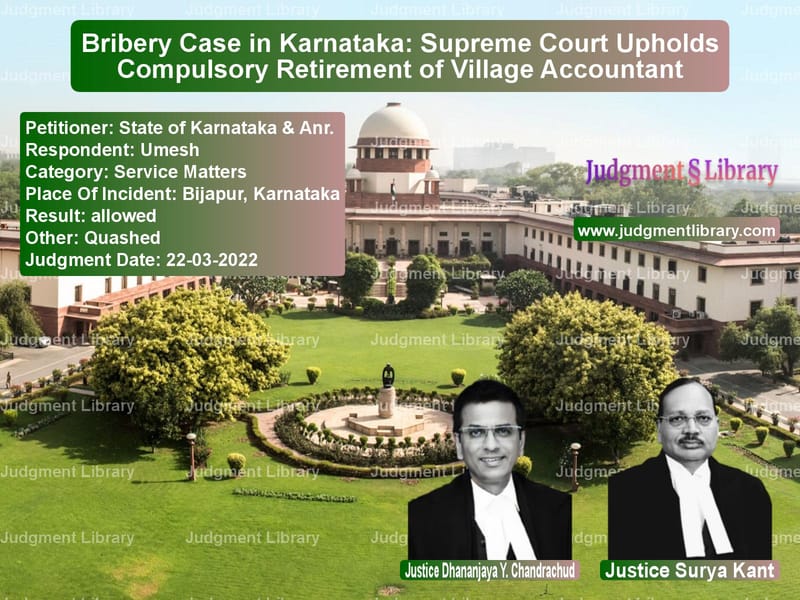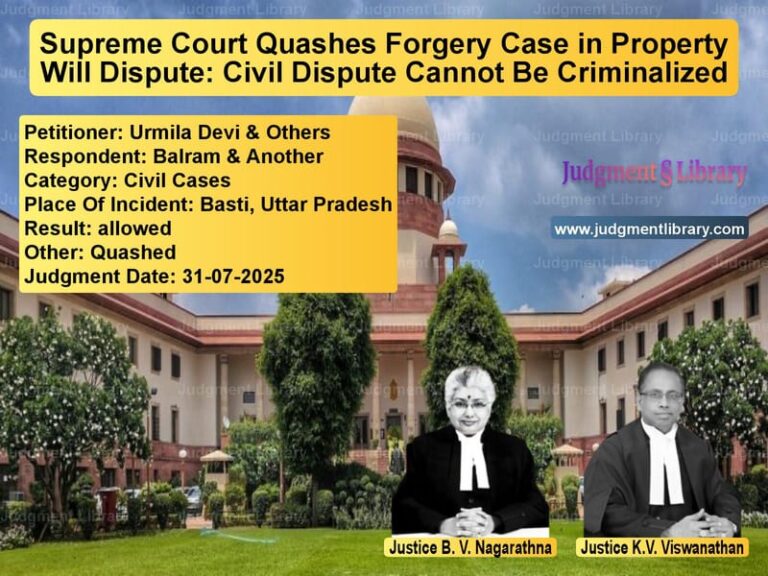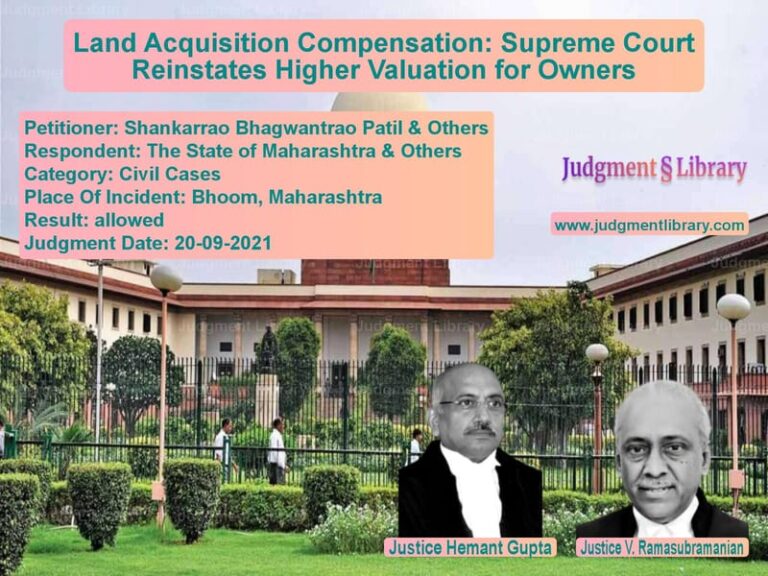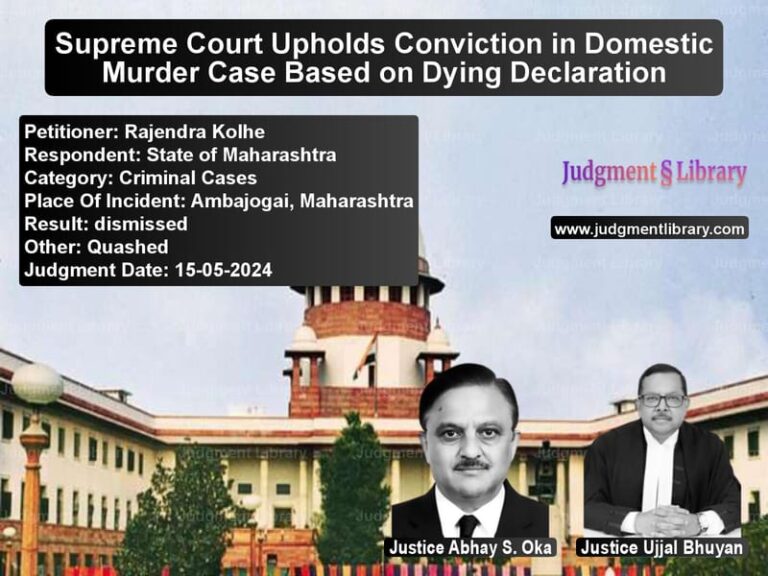Bribery Case in Karnataka: Supreme Court Upholds Compulsory Retirement of Village Accountant
The case of The State of Karnataka & Anr. vs. Umesh revolves around allegations of bribery against a Village Accountant in the State of Karnataka. The disciplinary proceedings and criminal trial ran parallel, resulting in conflicting decisions. The Supreme Court ultimately ruled in favor of the Karnataka government, upholding the disciplinary authority’s decision to compulsorily retire the respondent from service.
This judgment highlights key principles regarding the distinction between criminal proceedings and departmental disciplinary action, emphasizing that acquittal in a criminal case does not necessarily preclude disciplinary penalties.
Background of the Case
The respondent, Umesh, was employed as a Village Accountant in Revathagao, Indi Taluka, Bijapur District, Karnataka. He was accused of demanding a bribe of Rs. 5,000 for deleting a name from the revenue records (RTC). The complaint was filed with the Lokayukta police, leading to criminal prosecution under Sections 7 and 13(1)(d) read with Section 13(2) of the Prevention of Corruption Act, 1988.
A parallel departmental inquiry was conducted by the Karnataka Lokayukta. Based on the inquiry report, the disciplinary authority imposed the penalty of compulsory retirement on the respondent on June 25, 2015. Dissatisfied, the respondent challenged the order before the Karnataka Administrative Tribunal, which upheld the decision.
The respondent then filed a writ petition before the Karnataka High Court. The High Court ruled in his favor, stating that since he had been acquitted in the criminal trial, disciplinary action against him was unjustified.
The State of Karnataka challenged the High Court’s ruling before the Supreme Court of India.
Arguments of the Petitioner (State of Karnataka)
The State of Karnataka, represented by V.N. Raghupathy, argued:
- The acquittal in a criminal case does not automatically nullify the findings of a departmental inquiry.
- There was sufficient evidence in the disciplinary proceedings to establish the respondent’s misconduct.
- The Lokayukta police had recovered the tainted bribe money from the respondent, and the phenolphthalein test was positive.
- The Karnataka Administrative Tribunal had rightly upheld the punishment, and the High Court’s interference was unwarranted.
Arguments of the Respondent (Umesh)
The respondent, represented by Ashwin V. Kotemath, countered:
- The High Court correctly ruled in his favor, as he was acquitted by the criminal court.
- The evidence presented in the disciplinary proceedings was unreliable, and the findings were based on conjecture.
- The complainant in the criminal case had turned hostile.
- The respondent had provided an alternative explanation for the money recovered, stating that it was repayment of a loan.
- The Karnataka Lokayukta had overstepped its jurisdiction by recommending the punishment.
Supreme Court’s Observations
The Supreme Court, comprising Justices Dhananjaya Y. Chandrachud and Surya Kant, made several critical observations:
- The standard of proof in a criminal case (beyond reasonable doubt) is much higher than in a departmental inquiry (preponderance of probabilities).
- Acquittal in a criminal case does not bar disciplinary proceedings, particularly when evidence exists to suggest misconduct.
- The complainant turning hostile in the criminal trial does not mean that no misconduct took place.
- The phenolphthalein test and the recovery of tainted currency notes from the respondent’s possession were strong indicators of misconduct.
- The inquiry officer’s findings were based on material evidence, including testimonies from the shadow witness and the investigating officer.
The Court emphasized:
“The disciplinary authority was justified in its decision. The penalty of compulsory retirement was proportionate to the misconduct established in the inquiry.”
Supreme Court’s Verdict
On March 22, 2022, the Supreme Court ruled:
- The Karnataka High Court’s judgment was set aside.
- The Karnataka Administrative Tribunal’s decision upholding the penalty of compulsory retirement was restored.
- The respondent’s writ petition under Article 226 of the Constitution was dismissed.
The Court concluded:
“The finding of misconduct and the punishment of compulsory retirement are restored.”
Conclusion
The Supreme Court’s ruling reinforces several key legal principles:
- Criminal acquittal does not preclude disciplinary action: Employers can take action against employees based on misconduct, even if they are acquitted in criminal trials.
- Different standards of proof: Criminal trials require proof beyond reasonable doubt, whereas departmental inquiries rely on a preponderance of probabilities.
- Judicial restraint in disciplinary matters: Courts should not interfere with disciplinary authority decisions unless they are arbitrary or perverse.
- Public service integrity: The ruling upholds the principle that government employees must maintain integrity and cannot escape disciplinary consequences based on technicalities.
The Supreme Court’s decision ensures that the Karnataka government can take appropriate disciplinary action against corrupt officials, maintaining the integrity of public service.
Petitioner Name: State of Karnataka & Anr..Respondent Name: Umesh.Judgment By: Justice Dhananjaya Y. Chandrachud, Justice Surya Kant.Place Of Incident: Bijapur, Karnataka.Judgment Date: 22-03-2022.
Don’t miss out on the full details! Download the complete judgment in PDF format below and gain valuable insights instantly!
Download Judgment: state-of-karnataka-&-vs-umesh-supreme-court-of-india-judgment-dated-22-03-2022.pdf
Directly Download Judgment: Directly download this Judgment
See all petitions in Disciplinary Proceedings
See all petitions in Public Sector Employees
See all petitions in Termination Cases
See all petitions in Judgment by Dhananjaya Y Chandrachud
See all petitions in Judgment by Surya Kant
See all petitions in allowed
See all petitions in Quashed
See all petitions in supreme court of India judgments March 2022
See all petitions in 2022 judgments
See all posts in Service Matters Category
See all allowed petitions in Service Matters Category
See all Dismissed petitions in Service Matters Category
See all partially allowed petitions in Service Matters Category







